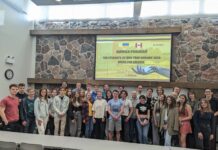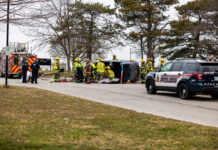Tabletop roleplay games (TTRPGs) have been around for several decades and have a long history that has surfaced only within the last few years. Popularized by the Netflix show Stranger Things, it is hard to find someone who has not heard of the most popular TTRPG in this day and age, Dungeons and Dragons (D&D), especially at the University of Waterloo, thanks to the UWaterloo Science Fiction Club.
TTRPGs are games in which players embody a fictional character of their creation to tell a story. In-game decisions are often made by rolling dice, which determines the degree and likelihood of success and failure. The story is led by a game-master or dungeon-master (GM or DM) — a person who acts as the narrator, keeps track of the game rules, roleplays non-playable characters (NPCs), and ultimately controls the direction of the story, although TTRPGs are inherently collaborative. Aside from D&D, other popular TTRPGs include Pathfinder, Call of Cthulhu and Generic Universal Role-Playing System.
Alex Wang, a 4B science and business (SciBus) student, was the president of the UWaterloo Science Fiction Club (WatSciFic) from Winter 2019 to Spring 2022. WatSciFic is one of the oldest running clubs at UW, and what started out as a club with a specific focus on science fiction writing has branched out into science fiction and fantasy books, films and games.
Wang was first introduced to D&D in Grade 6, and the idea of improvised roleplay within a rich, fantastical world intrigued him. However, he and his friends did not take the initiative to start a game until Grade 9.
“A bunch of friends got together, we got bored, we decided to try something new, and D&D came along.”
Wang says he has noticed great differences between himself and his friends since he started playing.
“We’re more open, and we take initiative. That helped with SciBus — taking initiative, not being afraid to speak up. […] It got me more friendly; making new friends, that also helps. I know people who keep playing D&D, they’re more open, and they’re not afraid to express their ideas; they’re not shy around new people.”
This openness and freedom of expression were not always commonplace within the TTRPG community, however, as the community once had to be careful about where and how the games were played. James Davis Nicholl, UW alumni and speculative fiction reviewer discovered TTRPGs through WatSciFic during his time as a student in the 1980s, at a time when conspiracies and negative media attention swarmed the world of TTRPGs.
“Forty years is a long time…and [the community] has gone through some major changes over that time period. […] The 80s was a big boom, and parents got very panicky about what their kids were doing. It was something called the ‘Satanic Panic,’ and people were convinced that roleplaying games were evoking infernal forces.”
“And then, in the early 90s, the market basically crashed. […] In ‘96 or ‘97, Game Designers Workshop went under, and it looked extremely grim, and I left in 2001 temporarily because all of the science seemed pretty awful. But then, in 2010 or 2015, things turned around, and it’s much more vibrant now than it was 20 years ago. It’s quite heartening to see where things are. It is more overtly accepting now than it was 40 years ago — although people of all kinds played games, companies seemed to only be aware of the ones who were white males,” Nicholl added. “[Today] the demographics of [WatSciFic] reflect the community on campus much more closely than they did 40 years ago.”
Wang had not expected the community to grow the way it has due to the rise of computer games.
“Due to the rise of computer games and mobile games — other things that take up people’s time — I’m actually pretty surprised that there are still a lot of people who play D&D. And it’s not just D&D — the WatSciFic community are trying out new TTRPGs as well. I’ve been playing for eight years, and people are trying out new things every single time. The community is evolving because people are taking matters into their own hands… They’re not cropped up with official content, they want to write their own stories.”
For Wang, D&D Fifth Edition remains his favourite game, for that is what he started with, and it has gained incredible amounts of popularity. “That’s what most people are playing in the North American community.”
Nicoll stated, “The games that leave the biggest impact are the ones you first get introduced to, and so for me, the ones that I’m still quite fond of are Traveller, Runequest, and Champions.”
TTRPGs give people the chance to escape their everyday stresses and openly be themselves, according to Wang. It is the reason games such as D&D have risen in popularity.
“Once everyone starts forgetting about their real identities, and they start getting into the personality of their character, they just forget about how shy they were before. It’s easier to ease into it when there are other people who are in the same situation. It’s a different identity for four hours — for my group, it’s almost six hours — you just forget that you are you. You don’t have to worry about the other aspects. It’s also very useful in the UWaterloo high-stress situation; people just reduce their stress load [by playing TTRPGs]. I’d like to say that their bodies adapt to the stress, so they no longer feel as stressed anymore. When you don’t have to worry about [work], your body just calms itself down.”
For new players, Wang and Nicholl recommend putting yourself out there and taking initiative, and being open to trying new things.
Nicoll said, “Online is your friend; it’s the easiest way to find other players. Bear in mind that while certain games enjoy a considerable edge in how visible they are — everybody’s heard of Dungeons and Dragons, many people have heard of Call of Cthulhu — if you don’t like the particular game you play, there are literally hundreds of games out there. There is probably one that suits your particular tastes, and you shouldn’t be disheartened because your first game isn’t quite what you’re looking for.”
Wang added, “Find some friends, grab a board, and start playing. Don’t be afraid. That’s the biggest thing — they’re afraid of playing, they’re afraid of not doing good, they’re afraid of speaking up and taking initiative and making a bad decision for the group, but don’t [feel afraid]. Whatever happens, happens. It’s a dice roll. Let the dice roll.”






























